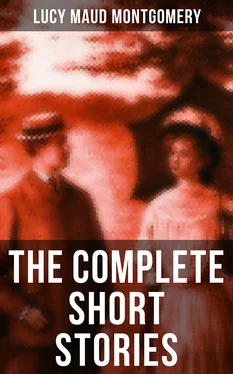“I promise, grandfather.”
Mr. Leonard drew a long breath of relief. He knew that promise would be kept. So did old Abel. The latter crossed the floor and sullenly took the violin from Felix’s relaxed hand. Without a word or look he went into the little bedroom off the kitchen and shut the door with a slam of righteous indignation. But from its window he stealthily watched his visitors go away. Just as they entered on the maple path Mr. Leonard laid his hand on Felix’s head and looked down at him. Instantly the boy flung his arm up over the old man’s shoulder and smiled at him. In the look they exchanged there was boundless love and trust — ay, and good-fellowship. Old Abel’s scornful eyes again held the golden flash.
“How those two love each other!” he muttered enviously. “And how they torture each other!”
Mr. Leonard went to his study to pray when he got home. He knew that Felix had run for comforting to Janet Andrews, the little, thin, sweet-faced, rigid-lipped woman who kept house for them. Mr. Leonard knew that Janet would disapprove of his action as deeply as old Abel had done. She would say nothing, she would only look at him with reproachful eyes over the teacups at suppertime. But Mr. Leonard believed he had done what was best and his conscience did not trouble him, though his heart did.
Thirteen years before this, his daughter Margaret had almost broken that heart by marrying a man of whom he could not approve. Martin Moore was a professional violinist. He was a popular performer, though not in any sense a great one. He met the slim, golden-haired daughter of the manse at the house of a college friend she was visiting in Toronto, and fell straightway in love with her. Margaret had loved him with all her virginal heart in return, and married him, despite her father’s disapproval. It was not to Martin Moore’s profession that Mr. Leonard objected, but to the man himself. He knew that the violinist’s past life had not been such as became a suitor for Margaret Leonard; and his insight into character warned him that Martin Moore could never make any woman lastingly happy.
Margaret Leonard did not believe this. She married Martin Moore and lived one year in paradise. Perhaps that atoned for the three bitter years which followed — that, and her child. At all events, she died as she had lived, loyal and uncomplaining. She died alone, for her husband was away on a concert tour, and her illness was so brief that her father had not time to reach her before the end. Her body was taken home to be buried beside her mother in the little Carmody churchyard. Mr. Leonard wished to take the child, but Martin Moore refused to give him up.
Six years later Moore, too, died, and at last Mr. Leonard had his heart’s desire — the possession of Margaret’s son. The grandfather awaited the child’s coming with mingled feelings. His heart yearned for him, yet he dreaded to meet a second edition of Martin Moore. Suppose Margaret’s son resembled his handsome vagabond of a father! Or, worse still, suppose he were cursed with his father’s lack of principle, his instability, his Bohemian instincts. Thus Mr. Leonard tortured himself wretchedly before the coming of Felix.
The child did not look like either father or mother. Instead, Mr. Leonard found himself looking into a face which he had put away under the grasses thirty years before — the face of his girl bride, who had died at Margaret’s birth. Here again were her lustrous gray-black eyes, her ivory outlines, her fine-traced arch of brow; and here, looking out of those eyes, seemed her very spirit again. From that moment the soul of the old man was knit to the soul of the child, and they loved each other with a love surpassing that of women.
Felix’s only inheritance from his father was his love of music. But the child had genius, where his father had possessed only talent. To Martin Moore’s outward mastery of the violin was added the mystery and intensity of his mother’s nature, with some more subtle quality still, which had perhaps come to him from the grandmother he so strongly resembled. Moore had understood what a career was naturally before the child, and he had trained him in the technique of his art from the time the slight fingers could first grasp the bow. When nine-year-old Felix came to the Carmody manse, he had mastered as much of the science of the violin as nine out of ten musicians acquire in a lifetime; and he brought with him his father’s violin; it was all Martin Moore had to leave his son — but it was an Amati, the commercial value of which nobody in Carmody suspected. Mr. Leonard had taken possession of it and Felix had never seen it since. He cried himself to sleep many a night for the loss of it. Mr. Leonard did not know this, and if Janet Andrews suspected it she held her tongue — an art in which she excelled. She “saw no harm in a fiddle,” herself, and thought Mr. Leonard absurdly strict in the matter, though it would not have been well for the luckless outsider who might have ventured to say as much to her. She had connived at Felix’s visits to old Abel Blair, squaring the matter with her Presbyterian conscience by some peculiar process known only to herself.
When Janet heard of the promise which Mr. Leonard had exacted from Felix she seethed with indignation; and, though she “knew her place” better than to say anything to Mr. Leonard about it, she made her disapproval so plainly manifest in her bearing that the stern, gentle old man found the atmosphere of his hitherto peaceful manse unpleasantly chill and hostile for a time.
It was the wish of his heart that Felix should be a minister, as he would have wished his own son to be, had one been born to him. Mr. Leonard thought rightly that the highest work to which any man could be called was a life of service to his fellows; but he made the mistake of supposing the field of service much narrower than it is — of failing to see that a man may minister to the needs of humanity in many different but equally effective ways.
Janet hoped that Mr. Leonard might not exact the fulfilment of Felix’s promise; but Felix himself, with the instinctive understanding of perfect love, knew that it was vain to hope for any change of viewpoint in his grandfather. He addressed himself to the keeping of his promise in letter and in spirit. He never went again to old Abel’s; he did not even play on the organ, though this was not forbidden, because any music wakened in him a passion of longing and ecstasy which demanded expression with an intensity not to be borne. He flung himself grimly into his studies and conned Latin and Greek verbs with a persistency which soon placed him at the head of all competitors.
Only once in the long winter did he come near to breaking his promise. One evening, when March was melting into April, and the pulses of spring were stirring under the lingering snow, he was walking home from school alone. As he descended into the little hollow below the manse a lively lilt of music drifted up to meet him. It was only the product of a mouth-organ, manipulated by a little black-eyed, French-Canadian hired boy, sitting on the fence by the brook; but there was music in the ragged urchin and it came out through his simple toy. It tingled over Felix from head to foot; and, when Leon held out the mouth-organ with a fraternal grin of invitation, he snatched at it as a famished creature might snatch at food.
Then, with it halfway to his lips, he paused. True, it was only the violin he had promised never to touch; but he felt that if he gave way ever so little to the desire that was in him, it would sweep everything before it. If he played on Leon Buote’s mouth-organ, there in that misty spring dale, he would go to old Abel’s that evening; he KNEW he would go. To Leon’s amazement, Felix threw the mouth-organ back at him and ran up the hill as if he were pursued. There was something in his boyish face that frightened Leon; and it frightened Janet Andrews as Felix rushed past her in the hall of the manse.
Читать дальше












